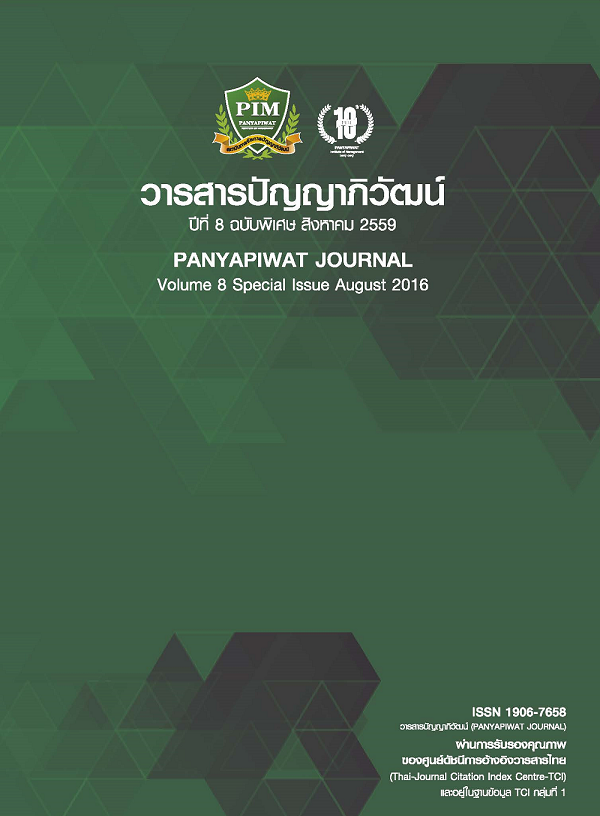การเขียนข้อสอบการอ่านที่สอดคล้องกับกลยุทธ์การอ่าน
Main Article Content
บทคัดย่อ
การอ่านเป็นทักษะหลักที่สำคัญหนึ่งในสี่ทักษะของการเรียนภาษาอังกฤษ จึงมีความจำเป็นต้องใช้กลยุทธ์การเรียนรู้ภาษา เพื่อนำมาใช้พัฒนาทักษะการอ่าน นักวิจัยพบว่า มีค่าสหสัมพันธ์สูงระหว่างการอ่าน และผลสัมฤทธิ์ทางด้านวิชาการ นอกจากการใช้กลยุทธ์ในการสอนแล้ว วิธีการวัดผลก็มีความสำคัญต่อการสอนเช่นกัน โดยมีการวัดผลหรือการสอบที่สอดคล้องกับทักษะการอ่าน ซึ่งทักษะการอ่านที่ช่วยให้ผู้เรียนประสบผลสำเร็จคือ การเรียนรู้กลยุทธ์การอ่าน ซึ่งประกอบด้วยการอ่านอย่างคร่าวๆ (Previewing), การหาใจความสำคัญของเรื่อง (Finding the main idea), การหาความหมายของคำอ้างอิงถึง (Finding the reference), ความเข้าใจจากการสรุปความ (Making inferences), การกล่าวใหม่ (Restatement), เจตคติหรือความมุ่งหมายของผู้แต่งและแนวโน้มของเรื่อง (Author’s attitude or purpose and tone of the passage) และยังรวมถึงหลักการเดาความหมายของคำศัพท์ภาษาอังกฤษโดยวิธีการสร้างคำ (Word formation) การสอบวัดความสามารถในการอ่านที่สอดคล้องกับกลยุทธ์การอ่านจึงประกอบด้วยคำถามที่ถามเกี่ยวกับการอ่านอย่างคร่าวๆ การหาใจความสำคัญของเรื่อง, การหาความหมายของคำอ้างอิงถึง, ความเข้าใจจากการสรุปความ, การกล่าวใหม่ เจตคติหรือความมุ่งหมายของผู้แต่งและแนวโน้มของเรื่อง และยังรวมถึงหลักการเดาความหมายของคำศัพท์ภาษาอังกฤษโดยวิธีการสร้างคำ (Word formation) การเรียนรู้กลยุทธ์การอ่านช่วยในการทำข้อสอบคือ ทำให้ผู้เข้าสอบทราบถึงประเภทของคำถาม เช่น เป็นคำถามเกี่ยวกับ main idea หรือคำถามด้าน making inference และเมื่อทราบประเภทของคำถาม เราจะรู้ว่าจะหาคำตอบได้จากตรงไหนของเนื้อเรื่อง ทำให้การตอบคำถามหรือการตอบข้อสอบง่ายขึ้น การเรียนรู้กลยุทธ์การอ่านและการเขียนข้อสอบ จึงมีส่วนสำคัญในการพัฒนาที่ช่วยให้ผู้สอนและผู้เรียนประสบความสำเร็จในการเรียนการสอนภาษาอังกฤษได้มากยิ่งขึ้น
Reading skills is one of the four main skills of English language learners. It is necessary that language learning strategies are used to improve reading skills. The researchers found that there was a high correlation between reading and academic achievement. In addition to implementing strategies to teach it, a measurement is vital for teaching as well. The assessment or examination should be consistent with reading skills. The reading skills that help students succeed are results of learning reading strategies. These include previewing, finding the main idea, finding the reference, making inferences, restatement, author's attitude or purpose and tone of the passage and also guessing words by word formation. The proficiency test in reading, corresponding to reading strategies includes questions that ask about previewing, finding the main idea, finding the reference, making inferences, restatement, finding the author's attitude or purpose and tone of the passage and also guessing words by word formation. Learning reading strategies can help in answering tests, that is, they enable the examinee to know the types of questions, such as questions about the main idea or questions about making inference. Upon knowing the type of questions, we will know where to find the answer from the passage. In this case ,it is easier to find the answers in the test. Learning reading strategies and writing tests, therefore, play important roles in development that allow teachers and students to succeed more in learning English.
Article Details
“ข้าพเจ้าและผู้เขียนร่วม (ถ้ามี) ขอรับรองว่า บทความที่เสนอมานี้ยังไม่เคยได้รับการตีพิมพ์และไม่ได้อยู่ระหว่างกระบวนการพิจารณาลงตีพิมพ์ในวารสารหรือแหล่งเผยแพร่อื่นใด ข้าพเจ้าและผู้เขียนร่วมยอมรับหลักเกณฑ์การพิจารณาต้นฉบับ ทั้งยินยอมให้กองบรรณาธิการมีสิทธิ์พิจารณาและตรวจแก้ต้นฉบับได้ตามที่เห็นสมควร พร้อมนี้ขอมอบลิขสิทธิ์บทความที่ได้รับการตีพิมพ์ให้แก่สถาบันการจัดการปัญญาภิวัฒน์หากมีการฟ้องร้องเรื่องการละเมิดลิขสิทธิ์เกี่ยวกับภาพ กราฟ ข้อความส่วนใดส่วนหนึ่งและ/หรือข้อคิดเห็นที่ปรากฏในบทความข้าพเจ้าและผู้เขียนร่วมยินยอมรับผิดชอบแต่เพียงฝ่ายเดียว”
References
ไกรคุง อนัคฆกุล. (2558). การสร้างรูปแบบการสอนภาษาอังกฤษโดยใช้กลยุทธการเรียนรู้ภาษา. คณะศิลปศาสตร์ สถาบันการจัดการปัญญาภิวัฒน์.
ไกรคุง อนัคฆกุล และกรรณิการ์ อนัคฆกุล. (2558). English for Admissions ภาษาอังกฤษเพื่อเตรียมสอบ. กรุงเทพ: ภูมิบัณฑิต.
ชาญณรงค์ อินทรประเสริฐ. (2546). การใช้กลวิธีการเรียนภาษาอังกฤษนอกชั้นเรียนของนักศึกษามหาวิทยาลัยเทคโนโลยีสุรนารี. สาขาวิชาภาษาอังกฤษ มหาวิทยาลัยสุรนารี.
สถาบันทดสอบทางการศึกษาแห่งชาติ (องค์การมหาชน) (สทศ.) (2558). ระบบประกาศและรายงานผลโอเน็ต. สืบค้นเมื่อ 20 เมษายน 2558, จาก http://www.niets.or.th/th/catalog/view/280
ธีราภรณ์ พลายเล็ก. (2554). ปัจจัยที่มีผลต่อการพูดภาษาอังกฤษของนักศึกษาชั้นปีที่ 2 สาขาวิชาภาษาอังกฤษ คณะครุศาสตร์ มหาวิทยาลัยราชภัฏในเขตกรุงเทพมหานคร.คณะครุศาสตร์ มหาวิทยาลัยราชภัฏสวนสุนันทา.
ผดุงชัย ภู่พัฒน์. (ม.ป.ป.). การจัดทำแผนผังข้อสอบ (Test Blueprint). คณะครุศาสตร์อุตสาหกรรม สถาบันเทคโนโลยีพระจอมเกล้าเจ้าคุณทหารลาดกระบัง.
Anderson, N. (1999). Exploring second language Reading: Issues and Strategies. Boston: Heinle & Heinle.
Anderson, N. J. (2003). ACTIVE Skills for Reading, Books 1, 4. Boston, MA: Heinle Publishers.
Carrell, P. L., Davine, J. & Eskey, D. F. (1989). Interactive approaches to second language reading. Cambridge: Cambridge University Press.
Cohen, A. D. (1998). Strategies in learning and using a second language. New York: Addison Wesley Longman Limited.
Cook, V. (2001). Second Language Learning and Language Teaching (3rd ed). London: Hodder Education.
Greenall, S. & Pye, D. (2000) Reading 2. Seventh Printing. UK: Cambridge University Press.
Kamhi-Stein, L. D. (2003). Reading in two languages. How attitudes toward home language and beliefs about reading affect the behaviors of “Underprepared” L2 College reading. TESOL QUATERLY, 37(1), 35-71.
Lobiondo-Wood, G. & Haber, J. (2010). Nursing research: Methods and critical appraisal for evaluation-based practice (7th ed). St. Louis: Mosby.
Oxford, R. L. (1990). Language learning strategies: What every teacher should know. Boston, MA: Heinle & Heinle.
___________. (1993). Instructional implications of gender differences in second/foreign language learning styles and strategies. Applied Language Learning, 4, 66-94.
PISA. (2012). results-Volume VI: Students and Money- Financial Literacy Skills for the 21th century. OECD.
Polit, D. F. & Beck, C. T. (2008). Nursing research: Generating and assign evidence for nursing practice (8th ed). Philadelphia: Lippincott.
Richards, J. & Samuela, E. (2003). Strategic Reading 3 Student’s book: Building Effective Reading Skills (Strategic Reading). London: Cambridge University Press.
Translated Thai References
Anugkakul, K. & Anugkakul, K. (2015). English for Admissions. Bangkok: Pum Bundit. [in Thai]
Anugkakul, K. (2015). Creating English Teaching Model by Using Learning Language Strategies. Faculty of Liberal Arts, Panyapiwat Institute of Management. [in Thai]
Intaraprasert, C. (2003). Using Learning English Strategies off-class Student of Technology Suranaree University. English Field, Suranaree University. [in Thai]
National Institute of Educational Testing Service (Public Organization) (NIETS). (2015). Announcement System and Report of ONET. Retrieved April, 20, 2016, from http://www.niets.or.th/th/catalog/view/280 [in Thai]
Plailek, T. (2011). Factors Leading to English Speaking of Second Year Students in English Programme Faculty of Education. Rajabhat University in the Bangkok Metropolitan Area, Faculty of Education Suansunandha Rajabhat University. [in Thai]
Poopat, P. (nd). Doing Test Blueprint. Faculty of Industrial Education, King Mongkut’s Institute of Technology Ladkrabang. [in Thai]

